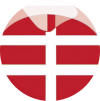Information about Ulvshale
Ulvshale is a peninsula and a settlement of the same name north of Stege on Møn. To the west of the peninsula lies the island of Nyord, which is separated by Ulvshale Løb. In the southeast the peninsula is bounded by Hegnede Bakke. The peninsula consists of material from Møns Klint, which is carried there by the sea currents. The landscape is therefore characterized by rows of low, parallel beach walls, which are mainly made of flint. By the 20th century, Ball Flint was dismantled, including cement and porcelain production.
In the center of the peninsula is the Ulvshale forest, which has been protected since 1929 and is allowed to develop as the country’s original primeval forest with many dead and felled trees. The original oak forest was in the late 18th and early Most of the 19th century felled and the area was used for grazing. From 1840 to 1860 the area was replanted, mainly with oak wood as in the original forest. Since the forest floor consists of beach embankments, the soil is lean, sandy and rocky. This means that the trees grow slowly and grow crooked in many places in the stony ground. [1] There are many blueberry bushes in the forest floor.
To the north of Ulvshaleskoven there are extensive salt marshes that serve as pastureland. Together with Nyord Enge and Horsnæs, these meadows form one of the most important bird areas in the country, with many breeding beach birds in summer and many migratory birds in spring and autumn. [2]
At Ulvshale beach on the east side there is a cottage and a camping site. South of Ulvshaleskoven there is another holiday home with natural parcels that are particularly planted with pines. From 1976 until his death in 2015, the German poet Günter Grass spent almost every summer at the Danish Nature Agency’s Vogterhus, which is located between Ulvshaleskoven and the beach meadows. Parts of the novel “The Flounder” were written here.
In the middle of Ulvshale is Ulvshalegård, which was built in the early 1870s by the radical politician Carsten Christensen. Today it belongs to the Danish Forest and Nature Authority and is used as a nature center.
The MP and founder of Rødkilde Folk High School, Frede Bojsen, bought Vedele meadows and part of the forest in 1879 and drained Lake Vedele. In 1890 he bought Ulvshalegård.
Ulvshale Camping
Regardless of whether you just want to laze on the beautiful sandy beach, enjoy the unique nature by bike or just go for a walk in the deep, calm tranquility of the forest, Ulvshale is always the place where body and soul find harmony. And where time only gently influences the environment.
